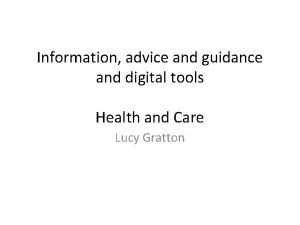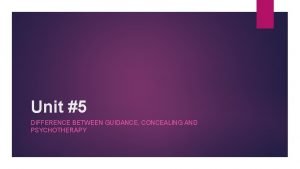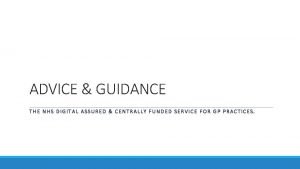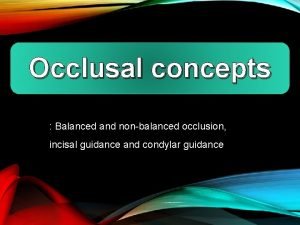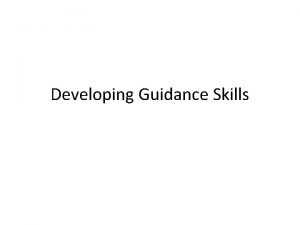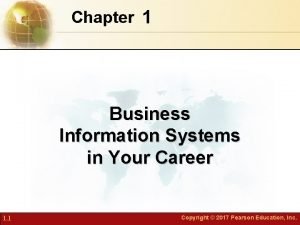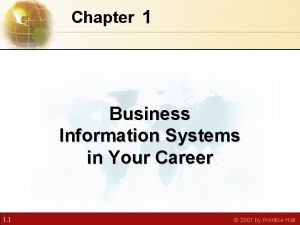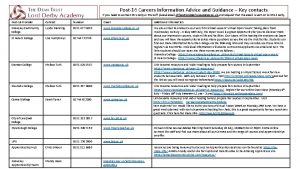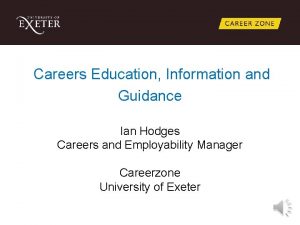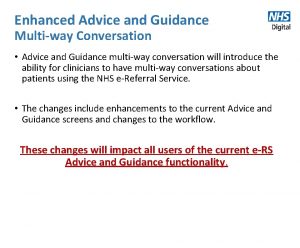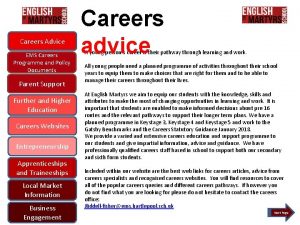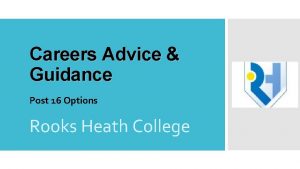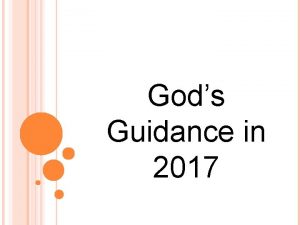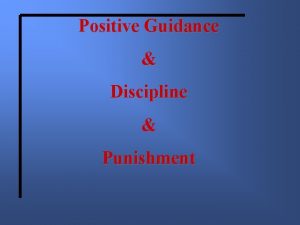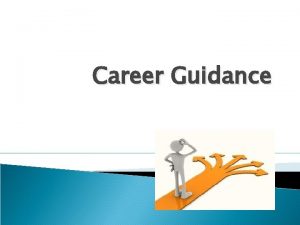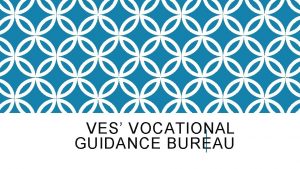WHAT ARE THE CAREERS INFORMATION ADVICE AND GUIDANCE













- Slides: 13

WHAT ARE THE CAREERS INFORMATION, ADVICE AND GUIDANCE NEEDS OF LEVEL 1 COMPUTING AND COMMUNICATIONS STUDENTS? David Conway and the STEM Careers and Employability Services Team

Introduction • As a result of a growing number of OU students studying for career motivations and greater service usage of Careers and Employability Services (CES), there has been significant University wide investment and increased emphasis on employability (e. g. Enhanced Employability and Career Progression project). • CES provide 1: 2: 1 and 1: 2: many (e. g. forums) career related learning services, activities and resources • Choice and design of 1: 2: many is based upon learning analytics, student feedback, employer feedback, industry/market trends and intelligence, input from faculty and professional experiences of staff within CES. • VOICE is the OU Customer Records Management system which logs 1: 2: 1 careers contact known as service requests (SRs) • VOICE SR Categorisation cannot be used effectively to understand needs at present as themes are too broad CAREERS AND EMPLOYABILITY SERVICES 2

6 broad themes with broad sub areas CAREERS AND EMPLOYABILITY SERVICES 3

Level 1 CES usage and School of Computing and Communications • Approximately 50% of careers SRs are from Level 1 learners • Very different to “brick universities” where majority of careers 1: 2: 1 s are with 2 nd and 3 rd year students • Potential reasons (other than Level 1 modules are our largest cohorts): o Mature 1 st year students (21 years +) have a clearer idea of what career they wish to pursue long term and are more likely to engage with career services (Zhu 2018) o Mature students typically have wider range of study motivational constraints in comparison with younger adult learners (Harnett, St George and Dron 2011, Baxter 2012, Bawa 2016) • School of Computing and Communications (C&C) students are one of the highest CES users (1: 2: 1 + 1: 2: many) CAREERS AND EMPLOYABILITY SERVICES 4

Aims and objectives The aim of this study was to complete a manual analysis of ALL Level 1 C&C careers SRs in the 2018 -2019 academic year (August 2018 to July 2019), categorising each to sub themes and areas below already achieved in VOICE. The objective of the project was to: • Enhance knowledge of the careers information, advice and guidance needs of Level 1 C&C learners Developing this knowledge as to why careers SRs are raised in C&C may enhance services provided by CES and C&C curriculum design CAREERS AND EMPLOYABILITY SERVICES 5

Method • 190 SRs (142 students) from Level 1 C&C modules were manually evaluated individually by an OU Careers and Employability Consultant (CEC) or Employability Adviser (EA) • Each SR was evaluated on 2 occasions blind (i. e. unknown if SR had been evaluated by peer already) • Description of perceived themes within each SR were recorded by CEC or EA • An CEC not involved within the evaluation compared identified themes within each SR • All SRs where the CEC/EA were in agreement on themes found were included in results. • The number of occasions themes were found in all SRs and hierarchal coding to sub levels below existing in VOICE were used to report results CAREERS AND EMPLOYABILITY SERVICES 6

Results • 45 SRs were excluded from results (39 SRs were for VOICE admin reasons, 6 unmatched themes) • Most careers SRs were multifaced and had numerous complex themes unsurprisingly! • Themes found in SRs were able to be categorised up to 3 levels deeper than in VOICE • 74 SRs were created by webform, 71 SRs created by staff referral CAREERS AND EMPLOYABILITY SERVICES 7

Results 2 Career related qualification choice advice Careers information, advice and guidance Careers related module choice advice 1; 1% 2; 1% 1; 1% 1% 2; 2; 1% 2% 3; 3; 2% 6; 4% 10; 6% Gaining practical experience CV support Jobsearch support 52; 33% Support changing career into IT 14; 9% 15 Themes Redunancy support Career planning Preparing for interview 19; 12% Working from home 40; 25% Study issues Application support Finding work with a disability Will my age be a barrier in changing career CAREERS AND EMPLOYABILITY SERVICES 8

Results 3 • The 4 most common SR themes had sub themes and sub areas The most regular sub themes were: 1. 2. 3. 4. 5. • Career options if I change from OU C&IT to ? ? (15) (Careers related qualification choice advice) How C&IT module choice impacts career options(11) (Careers related module choice advice) Career options with OU C&IT degree (11) (Careers, information, advice and guidance) How to gain any practical experience in C&IT (8) (Gaining practical experience) What qualification is best for my career OU C&IT or ? ? (7) (Careers related qualification choice advice) No significant reoccurring sub areas were found at a deeper level e. g. Learners were interested in changing from C&IT to 10 different qualifications CAREERS AND EMPLOYABILITY SERVICES 9

Discussion • Results show Level 1 C&C learners who seek or are referred for 1: 2: 1 careers support have complex CIAG needs and regularly: • Are unsure if they are studying the correct qualification and/or pathway for professional goals o Part time students are twice as likely to change career plans in the 1 st year in comparison with full time students (Callender and Williams 2012) o Wrong choice of study is a highly significant factor in early university withdrawal (Comfort et al 2002) • Consider career beyond context of qualification o Wide range of study motivations, careers related questions and motivational constraints • Need to be referred to careers services o mature student careers paradox? ? – poor prior experiences with career advice, lack of understanding of what happens in 1: 2: 1 careers intervention, its purpose, value (Brimrose, Barnes and Hughes 2008) o Unaware of CES? ? – Approximately 73% of Levels 0 -4 STEM students aware of CES. Could this figure be lower at level 1? CAREERS AND EMPLOYABILITY SERVICES 10

Recommendations • CES needs to be prominent pre and during Level 1 C&C activities - Greater emphasis on careers, information and guidance before and early within a students university life (very different to brick university) • Waiting until Level 1 teaching starts to promote careers support may be too late for some! o Pre entry information, advice and guidance – right choice, 1 st time • Level 1 C&C careers activities could involve (some of which has began and all of which augments other good work): o Enrolment career readiness survey – proactively offer support to students identified with career needs (Achieving Your Goals Pilot in Scotland) o Promotion of CES in pre module/induction/welcome activities o Employer engagement (e. g. virtual fairs, internships) o Improved links between curriculum and CES (embedding employability in curriculum, reference CES services) o Personal development planning for academic and professional reasons (Future. YOU) CAREERS AND EMPLOYABILITY SERVICES 11

Conclusion • CEC’s and EA’s supporting Level 1 C&C students must be highly knowledgeable in careers related learning, the education sector and the jobs market beyond computing and IT to effectively support learners who typically have complex careers, information, advice and guidance needs • Level 1 C&C students are most likely to require 1: 2: 1 careers support relating to qualification or module choice • Although previous evidence suggests 1 st year mature students are more likely to seek careers support in comparison to younger full-time students, this study highlights how mature learners often need service referral. This could be due to career service student perceptions, understanding and awareness • Increased inclusion of careers and employability pre entry and during (e. g. AYG, Employability Framework and Future. YOU) Level 1 C&C may enhance Level 1 student retention, progression and success CAREERS AND EMPLOYABILITY SERVICES 12

References Baxter, J. (2012). Who am I and what keeps me going? Profiling the distance learning student in higher education. The International Review of Research in Open and Distributed Learning, 13(4), 107 -129. Bawa, P. (2016). Retention in Online Courses: Exploring Issues and Solutions—A Literature Review. SAGE Open. https: //doi. org/10. 1177/2158244015621777. Bimrose, J. , Barnes, SA and Hughes, D (2008). Adult career progression and advancement: a 5 year study of the effectiveness of guidance. Available at: https: //warwick. ac. uk/fac/soc/ier/publications/2008/eg_report_4_years_on_final. pdf (22/4/2020). Callender, C and Wilkinson, D (2012). FUTURETRACK: PART TIME HIGHER EDUCATION STUDENTS – the benefits of part time higher education after three years of study. Available at: https: //hecsu. ac. uk/assets/documents/futuretrack_part_time_students_report_oct 2012. pdf (22/4/2020). Comfort, H. , Baker, P. and Cairns, L. (2002). A Qualitative Study Investigating Factors which Help and Hinder Learning Progression FE to HE. Report on the Transitions Project. Leicester College, UK. Hartnett, M. , St. George, A. , & Dron, J. (2011). Examining motivation in online distance learning environments: Complex, multifaceted, and situation-dependent. The International Review of Research in Open and Distance Learning, 12, 20 -38. Zhu, C (2018). AGCAS First Year Career Readiness Research. Available at: https: //www. agcas. org. uk/write/Media. Uploads/Firstyear_Student_Career_Readiness_Report_2018_-_final_9_July_2018. pdf (1/4/2020). CAREERS AND EMPLOYABILITY SERVICES
 Antigentest åre
Antigentest åre Digital advice and guidance
Digital advice and guidance Guidance
Guidance Eclipse live nhs
Eclipse live nhs Cross tooth cross arch balance
Cross tooth cross arch balance What is direct and indirect guidance
What is direct and indirect guidance How will information systems affect business careers
How will information systems affect business careers How will information systems affect business careers
How will information systems affect business careers Hát kết hợp bộ gõ cơ thể
Hát kết hợp bộ gõ cơ thể Bổ thể
Bổ thể Tỉ lệ cơ thể trẻ em
Tỉ lệ cơ thể trẻ em Chó sói
Chó sói Tư thế worms-breton
Tư thế worms-breton

